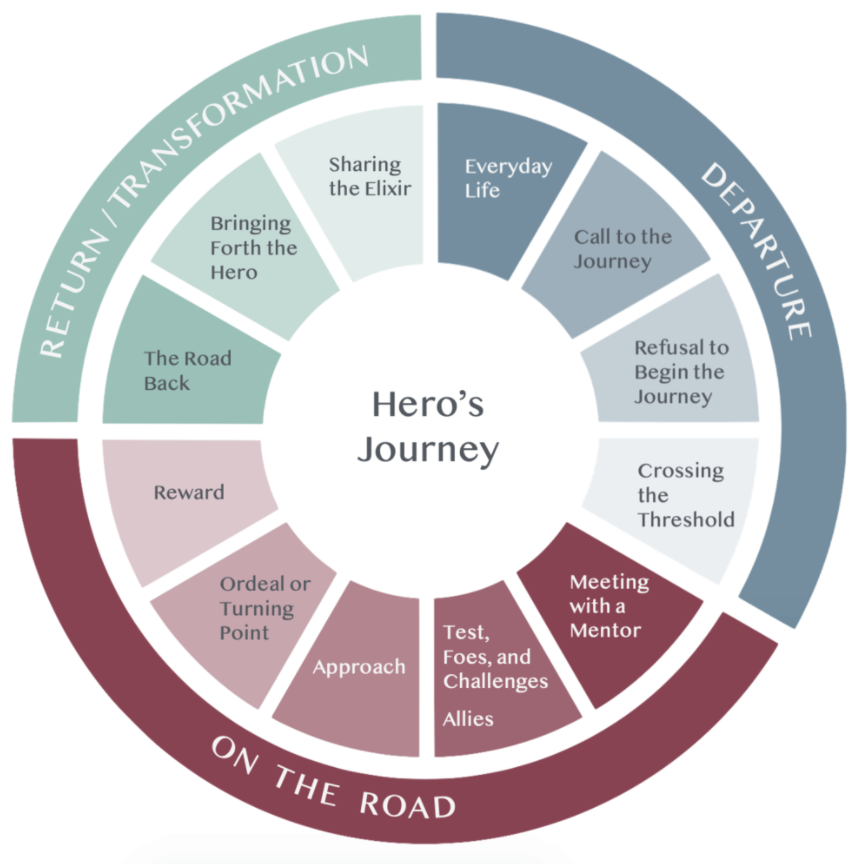Why is it important to share your grief story?
So let me be clear: you don’t need to share your story, but if you do, you have the choice over how much you share and with whom.
I have found working with clients time and time again that there was healing power in talking about not just what happened but also how they faced adversity and how they found hope within the dark.
Joseph Campbell’s Hero’s Story applied to grief
Joseph Campbell, an American professor of literature, found out that for thousands of years people all over the world communicated with stories having similar patterns and basic elements. He structured these patterns and elements into 12 phases, or stages, and called it “The Hero’s Journey“. These stages incorporate mechanisms that connect people on a deeper, core level.
No wonder this technique is so popular in Hollywood. You can find the 12 phases of Hero’s Journey in almost all of the movies.
Campbell’s Hero Journey Model
Without diving into too many details of those phases, the Hero’s journey can be boiled down to three essential stages:
- The departure: The Hero leaves the familiar world behind.
- The initiation: The Hero learns to navigate the unfamiliar world.
- The return: The Hero returns to the familiar world.
Let’s explore the details of the three stages:

Departure
In brief, the Hero is living in the so-called “ordinary world” when he receives a call to adventure.
Usually, the Hero is unsure of following this call — this phase is known as the “refusal of the call” — but is then helped by a mentor figure, who gives him counsel and convinces him to follow the call.
Initiation – On the road
In the initiation section, the hero enters the “special world,” where he begins facing a series of tasks until he reaches the story’s climax — the main obstacle or enemy.
Here, the hero puts into practice everything he has learned on his journey to overcome the obstacle.
Campbell talks about the hero attaining some kind of prize for his troubles — this can be a physical token or “elixir”, or just good, old-fashioned wisdom (or both).
Return – Transformation
Feeling like he is ready to go back to his world, the hero must now leave.
Once back in the ordinary world, he undergoes a personal metamorphosis to realize how his adventure has changed him as a person.
Application to grieving a loss
Many people facing loss would oppose the loss being “a call to adventure”. Nevertheless, the bereaved would probably agree with me to call grieving “a hell of a journey”.
Departure
The ordinary world: A person is living their every day, “before-loss” life, unaware of what awaits them. (Comfort Zone)
The call to adventure: The person is experiencing a loss (divorce, losing a job, the ending of a relationship, the loss of a role as a parent, etc.) and is asked to step into the unknown. The call within the context of grief may be expected, but more often it is unexpected, unwelcome, and unwanted. The individual rarely feels prepared, often caught by surprise. Regardless of the circumstance, an invitation has been made and the individual must grapple with the invitation to deal with the loss. (Stressor: Sadness, guilt, blame, helplessness, depression, anger)
Initiation – On the road
Refusal of the call: The person can’t believe what is happening to them. They feel like they are an actor in a movie. The individual must grapple with whether to accept the invitation or decline. (Denial)
Mentor: Support people, such as friends & family members, colleagues, doctors, nurses, therapists show up and help the person face the fact of the loss. (Grief Support)
Crossing the threshold: The person realizes the loss more and more, for example when attending the funeral, or seeing their ex with another new friend, etc. They are moving into their “after-the-loss” life. (Dealing with all the feelings and stages of grief, moving towards acceptance)
The ordeal: The person is dealing with grief’s pain, grief triggers and is learning to live without the person, pet, thing, or any other situation they lost. While enduring the grief journey, a powerful secret about ourselves is discovered: We can survive grief’s pain. And it almost killed us. (Self-reflection, self-knowledge, understanding of grief’s pain on a physical, mental, emotional and spiritual level)
Return – Transformation
The return: The person has experienced not just loss and the intensity of grief’s pain but also that they can survive it. They return, non in terms of getting back to the “before-loss” life or the person they were before but transformed by the experience and becoming a new person. (True acceptance, self-compassion, and integration back into life)
Teachings from Joseph Campell’s Hero’s Journey in grief
As witnessed in every hero’s journey ever told, regardless of where the challenges originate, the hero must find effective approaches and develop strategies that will aid them in their recovery.
The same applies to the bereaved hero:
- You need to find approaches that help you deal with your emotions and grief triggers
- You need to collect strategies to deal with those mentioned
- You need to apply those strategies
- The aim is to re-integrate into life, with and through the transformation of the grief journey.

